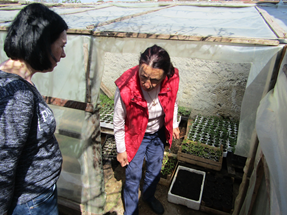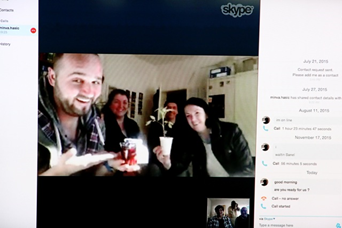Read on for the latest update on our project for Economic Development for Women in Rural Bosnia and Herzegovina.
PROMOTING ECONOMIC OPPORTUNITY AND PEACE IN BOSNIA – ONE TOMATO AT A TIME
Over the past year, the Rotary Club of Ojai has been working with our partner, Rotary Club of Mostar, and cooperating organization, Association Orchid Stolac, to promote peace in Bosnia - one jar of dried tomatoes at a time - through a $71,000 economic development Global Grant. Raising and selling sun dried tomatoes doesn’t seem that impressive as a peace-building tool, until you hear the backstory and what had to happen to make it possible. Our project is centered in Stolac, a town with a population of 11,000 with beautiful mosques and churches, surrounded by serene mountains and rivers in the loveliest part of Bosnia and Herzegovina. Only as you walk around the town do you see the still-visible reminders of the brutal Bosnian war (1992-1995) that pitted Bosnians of different ethnic/religious groups against each other, leading to ethnic cleansing and systematic rape (140,000 people killed, and estimates of 50K- 60K women raped). Men from Stolac were taken to concentration camps or killed, and women and children were interned in refugee camps for the duration of the war. After an uneasy peace, they trickled home to find their town decimated, with formerly prosperous businesses shut down, and their homes destroyed or occupied by the very people that forced them to flee. Today ethnic/religious tensions persist, and people are still trying to heal emotional wounds and recover economically. Ethnic divisions are central to how things run in Stolac. Even the school is divided into two parts. Catholic and Muslim students share the same building, but their classrooms are on different floors, and they have different teachers and recesses, and different textbooks that are written from different points of view. As with the school, other places of business are divided too: coffee bars, restaurants, hairdressers, etc. This affects hiring and job availability. Women have unemployment rate of 85%, and many are heads of household since the war. Many citizens emigrated after the war, and young people today frequently leave to seek economic opportunity in EU countries. Ojai Rotarians wanted to do something to help, but never dreamed that sun dried tomatoes were the key – this was the brainstorm of some resourceful women in Stolac. Our global grant seeks to improve the local economy, by growing, drying, processing and selling dried tomatoes through a cooperating organization that has beneficiaries from all three ethnic groups. Udruzenje Orhideja Stolac (Association Orchid Stolac) is a grassroots NGO founded in 2004 and has 160 women participants, most of whom belong to the war returnee population and are single mothers. It organizes community development in Stolac and surrounding rural villages, promoting goals to strengthen a civil society, primarily by empowering women of all ethnic and religious groups with emotional, social and civic competencies through skill development in sewing, agriculture, marketing, environmental workshops, and providing seminars on gender equality and women’s rights. In 2014 the Association with several women grew, dried, and sold 4 tons of tomatoes, and discovered a high demand for their product that they were unable to provide in sufficient quantities. They wanted to build on this previous success, but didn’t have the capital to increase production or expand the market potential geographically beyond small local markets. Our grant made this possible.
The $71,000 Global Grant provided training for 11 farming locations (with 3-4 members in extended families at each location) in the production, drying, processing, and preserving of tomatoes for sale within Bosnia. Faculty from the Agromediterranean Faculty at University of Mostar (which is much like Cal Poly SLO) gave lectures on plant cultivation, pest control, and drying and processing tomatoes, and advisors toured beneficiaries’ farms. The global grant also provided salaries for staff (a program manager, assistant, part-time accountant, fulltime agronomist to advise the growers, and a driver), purchased a delivery vehicle and supplies (seedlings and growing supplies, drying racks, canning jars and packaging and promotional materials) and paid the growers the first season. Ojai Rotarian and small business consultant Mike Weaver helped Association staff develop of a business plan, and consulted with staff on marketing and sales strategies in order to sell their large quantity of product to commercial customers through promotions, advertising and networking marketing through Association Orhideja Stolac. In October 2016, five Ojai Rotarians went to Bosnia to meet the Mostar Rotarians, and spent three days in Stolac checking on the project. We were extremely pleased with their meticulous accounting and records, and seeing the ubiquitous cases of jars of dried tomatoes – stacked to the ceiling against the wall, under the tables, in the storage rooms - everywhere! We toured a farm, met beneficiaries, and were impressed by the Association staff’s herculean efforts and determination. We met several young people who are involved in sales, and are sticking around Stolac. It gave faces and personal stories to the grant’s numbers and narrative, reminding us why all those hours of work on the grant were important. In the past few months, larger orders have been filled, they have sold most of their inventory and are developing relationships with retailers, insuring that there will be funds to continue the project this coming season after the grant is completed. They are now getting ready to start their second season and have recruited another 5 farms of an additional 12 beneficiaries. They have begun to raise the seedlings and train the new growers in best practices. They expect to increase their output of jars of sun dried tomatoes by 20-50%. They need a place to for a true production operation and to automate their packaging process. An organization in Bosnia has offered to do just that, but they want Association Orchid Stolac to match the cost of the automated packaging equipment. They need to raise $15,000 to make this happen. If you can help, please contact Mike Weaver, (805) 646-4745 or amweaver@pacbell.net. So what does this have to do with peace building? In a town where neighbors killed neighbors 24 years ago, and now employers still only hire people of their own ethnic group, and where farmers distrust outside innovations different from the way they have farmed for years, and rarely speak to farmers not of their own ethnic group, 11 family groups (7 Moslem Bosniak, 3 Eastern Orthodox Serbs, and one Catholic Croat) have learned new farming methods together, and successfully worked together to achieve a common goal of producing, processing, and selling tomatoes. When it came time to sign contracts for the new 2017 season, all the farmers returned, and five new groups from neighboring farms signed on too. It may not be world-shaking, but it is bridge building – one dried tomato at a time.
In March and April 2016 the following progress was made:
- Project was started, staff were hired, and contracts were signed with project staff:
- Project coordinator – Minva Hasic
- Assistant coordinator – Sanel Maric
- Project accountant – Belma Kekic
- Project agronomist – Admit Hamzic
- Driver – to be assigned in May
- Staff made a public call through social media, posting posters in public places, and informational meetings in selected areas for women who want to grow tomatoes and process them for local market in Bosnia through a marketing co-op.
- After public meetings and applications from over 20 family groups, staff visited all potential beneficiaries to ascertain that their land and water availability was appropriate for project
- 12 locations were selected, with 3-4 family members working at each location
- Recipients were mostly unemployed, geographically spread among the 5 villages, and represented all ethnic/religious groups (2 Catholic, 3 Eastern Orthodox, 7 Moslem).
- When the selection was done staff met with beneficiaries to sign contracts.
- Staff researched where to buy best tomato seedlings.
- Staff made several trips to Mostar and Capljina.
- When staff had gathered all necessary information they decided to buy tomato seedlings from Sjemenarna Mostar.
- Meeting with beneficiaries took place at NGO Orhideja headquarters.
- Tomato seedlings were delivered as was previously agreed.
- Staff communicated with University in Mostar, Department of Agriculture, to finalize details of their engagement in this project.
- Teaching and consultation by university staff with beneficiaries will begin in May.
- Global grant project staff at NGO Orhideja met via Skype with Ojai Rotarians.
- Introduced all staff employed through the grant, reported on the project to date, and discussed business plan with Mike Weaver, business consultant, and Kay Bliss, primary Ojai contact for the grant.
Grant Project Photos of Global to Date: March and April 2016
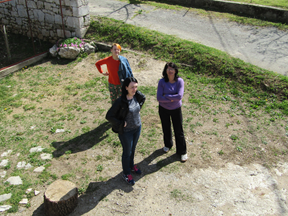 Staff met with potential beneficiaries in 5 communities to see if they were a good match, and to discuss plans | 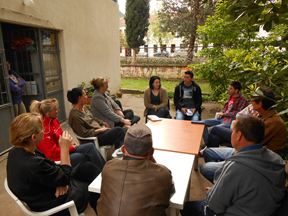
|
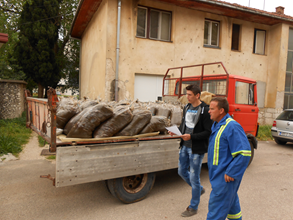 Bringing planting mix for seedlings
Beneficiary shows her seedlings to project coordinator Minva Hasic
| 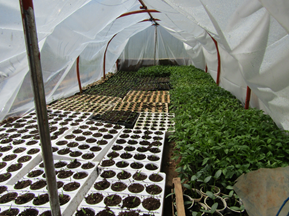 Seedlings got an early start in greenhouses
Skype call - NGO Orhideja team show tomato seedlings and finished product. |
